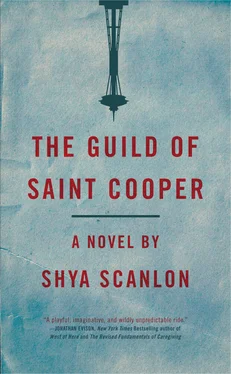The bus let me off two blocks from home, and I hadn’t taken more than four steps before a neighbor pulled up and offered me a ride. Her name was Josie, a literal beauty queen — her husband kept her crown on the mantel, much to Josie’s embarrassment — who’d been mercifully flirtatious throughout high school, when just about all other adults had been toxic. In back was her daughter, Alice, reading a book with an elephant on the cover.
“Hello, Alice,” I said, turning around in my seat. “How old are you now?”
The girl looked out the window.
“How old are you, sweetie? Blake asked you a question.” Josie winked at me. “I don’t think she remembers.”
Alice rolled her eyes. Josie pulled over. For a moment I thought it was because of her daughter’s response, but we were simply at their house.
She got out, helped her daughter down, and pulled a couple bags from the trunk. Then she stood outside the passenger-side window and bent over, smiling quizzically. Alice giggled, seeing me still in the car. What was I doing in their car, just sitting there? I got out, thanked Josie for the ride, and headed down the block.
Josie called to me, and I turned to see her head poking out the door. Her daughter was already inside.
“You’re here for the summer, right? Stop by sometime!”
I waved. I wondered what a woman like Josie saw in her husband, Happy. Happy was a stiff, distant man. Not handsome. Not rich. Not happy.
My brother’s old Datsun was parked in front of the house and my mother’s Escort was in the driveway. The overgrown front yard made it difficult to walk up the path to the front door, which for this reason had fallen into disuse, but as I walked around to the side I noticed a cardboard box the size of a small refrigerator standing on the porch. My mother and brother were sitting on the back porch, smoking. I chose to avoid making the obvious observation about this.
“What’s with the box on the front porch?” I asked.
My mother tried to blow a smoke ring. “It’s for your father.”
“Any word from him?”
My father was doing a job for some Russian czar up in Alaska, where all flights had been temporarily cancelled due to an eruption of Mt. Redoubt. He was trying to get home. He would be home as soon as possible.
“He said we should expect a big package.”
My brother went inside and returned with a bag of chips. He’d put on some weight since I’d gone to college, but it suited him. He was taller than me, and with the added padding he had the kind of gravity big men have. I tried to picture him with Blake — she’d always liked his directness.
As if reading my mind, he asked about my day. “How’s OB doing?”
Other Blake.
My mother swatted at him, and he spilled a few chips onto the deck. He crushed them and swept them between the boards with his shoe. I shrugged.
“What does redoubt mean, anyway?” I asked. “Isn’t it like to call into question? Like an aspersion?”
My mother coughed. “Blake, seriously. First of all, an aspersion isn’t to call into question, it’s slander. You’re thinking of dispute.”
“I don’t think so.”
“I know so.”
I went into the house. “I’m going to open that package,” I said.
I grabbed a knife from the kitchen and brought it to the front porch, where I went to work cutting through the tape across the topmost seam. Down one side of the box were staples, however, so even after opening the top I had to tear the thing apart carefully to avoid getting poked. My brother came and stood at the doorway, munching chips.
“So,” I said, “you haven’t seen Blake recently, huh?”
Kent grinned.
“I knew it!”
I was about to give him shit for this, but at that moment the stapled side of the box came loose and packing peanuts spilled out onto the porch. Inside the box, something bright and metallic and unrecognizable glinted through the foam. I scooped out more peanuts and pulled away another side of the box and what emerged was some kind of sculpture. Thin plates of metal, possibly tin, were assembled in the shape of an animal, possibly avian. It was steely blue, with green and yellow accents, and presently a red, lightning-like piece fell at my feet. Apparently, the thing had been damaged en route.
“Thoughts?” I said.
“It looks like a bird,” said Kent. “Chicken, maybe?”
My mother came to stand beside Kent; she peered out at the unidentified object. Beside my brother, she looked even smaller than she was, and her thin, pale face seemed to shimmer and float in the darkness of the house.
“It’s a fort,” she said, following up on my earlier mistake. “A kind of fortress.”
“A chicken fortress.”
“Kent,” I said. “Do you have any more weed?”
I WOKE LATE TO find my mother standing before a table covered in bouquets. Her hair, usually in a bun on the back of her head, was down now, and it seemed to me that more gray had come in, thin stripes of it running through the straight brown stuff coating her shoulders and neck. She turned to me with a big shitty grin.
“Aren’t they beautiful?” she said.
But the smile wasn’t insincere, not really. It was just wound up in something bigger than her gifts. Several cards were tented at the bases of their respective vases, and I picked one up. It was from “South Central WIC” and read, “Our thoughts are wish you in this difficult time.” I showed her the card.
“Wishful thinking,” she said.
I continued to the kitchen. “I’m surprised so many people know.”
It was not that my mother was a private person. She was amiable and frank. But she hated to be a nuisance — something at odds, I’d always thought, with her ’60s activist past. I poured myself a cup of cold coffee and stuck it in the microwave. The doorbell rang and she went off to accept another bouquet, leaving me with the vaguely funereal display. The situation was serious, but this seemed premature. She hadn’t even been diagnosed. And when she received that diagnosis — my instincts on this had not changed — wouldn’t the second round of flowers lack impact? Or were stuffed animals next? My mother brought in the new bouquet and placed it with the others. These were white, with soft, drooping stems and downturned blooms. They resembled heads in prayer, I thought, or mourning, though the card explained that they meant hope.
“How are you doing today,” I said, not a question exactly. My coffee beeped and I pulled out the steaming cup.
“I’ve been thinking about poetry,” she replied. “I’ve been rereading Carl Sandburg these last few days.”
She closed her eyes and stood a little straighter.
“‘When you come back we may sit by five hollyhocks,’” she said. “‘We might listen to boys fighting for marbles. The grasshopper will look good to us.’” She peeked out at me. “What do you make of that?”
I yawned. “It’s pretty early.”
“I think that’s an essential part of poetry. The not knowing.”
The room smelled terribly of flowers. I thought this might be a good time to tell my mother I was thinking about planning on dropping out of college. Perhaps the poetic spirit would let her look past the obvious weakness of my response to the vulnerability of dorm life, something my roommate had once compared to a “fish tank without the glass.”
“I’ve actually been writing a little, lately,” I said.
“You’ve always had an artistic temperament.”
My mother moved her face around over the flowers, and before I could broach the college topic Kent came bounding up the back stairs. He’d been out all night and looked both disheveled and invigorated, his movements alert, jerky, exact. He passed me on his way to the fridge and grabbed a beer. With a quick twist he palmed the cap and flipped it into the trash. My mother didn’t seem to notice this, or if she noticed she didn’t seem to mind, and I marveled at the way he had her trained: my brother, only seventeen, had the run of the house.
Читать дальше












